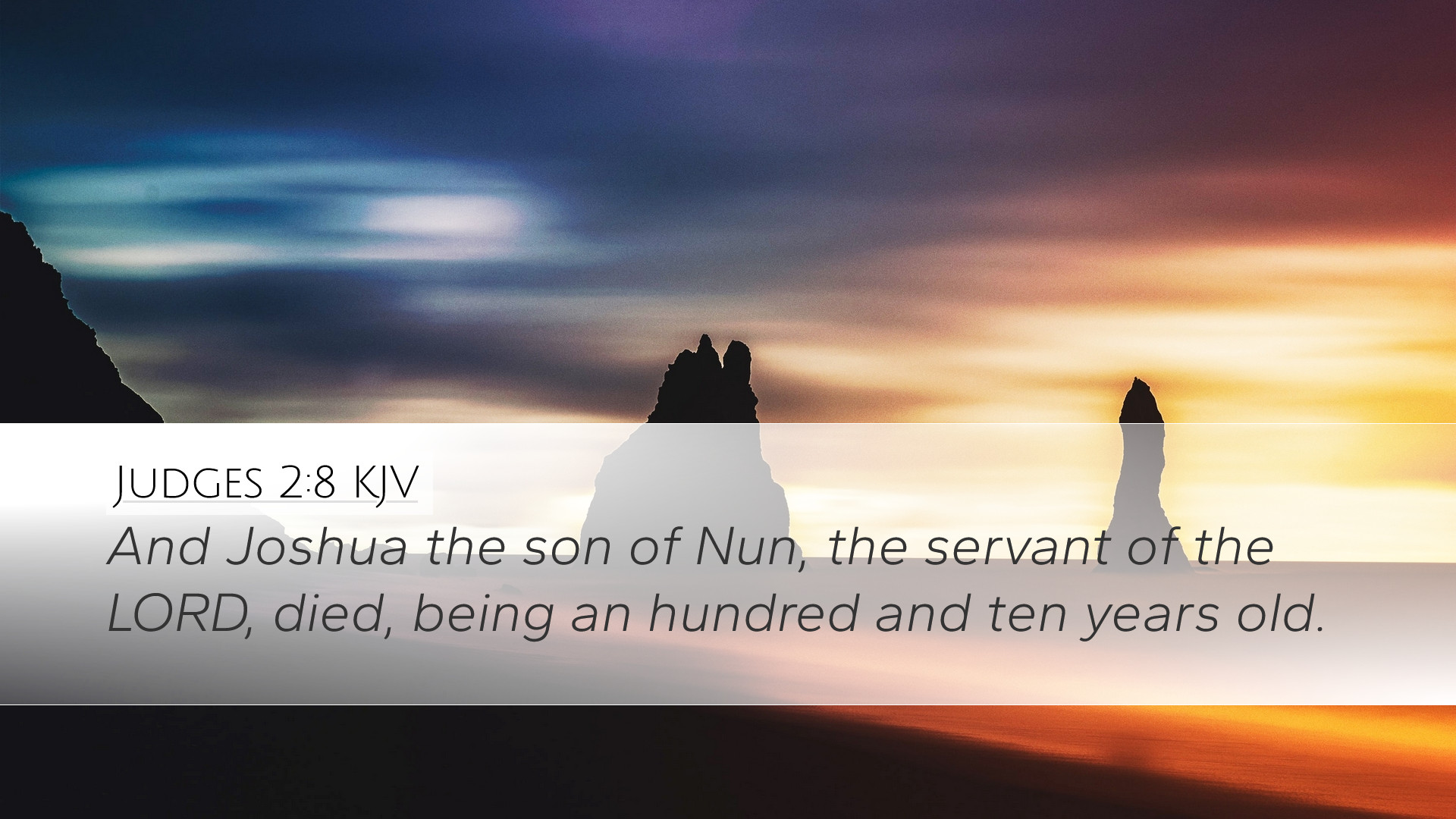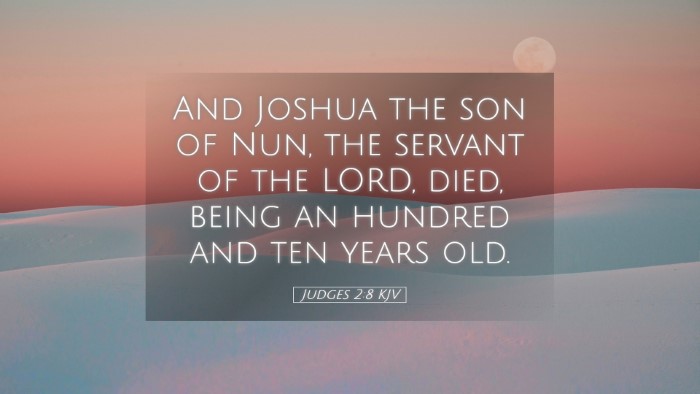Old Testament
Genesis Exodus Leviticus Numbers Deuteronomy Joshua Judges Ruth 1 Samuel 2 Samuel 1 Kings 2 Kings 1 Chronicles 2 Chronicles Ezra Nehemiah Esther Job Psalms Proverbs Ecclesiastes Song of Solomon Isaiah Jeremiah Lamentations Ezekiel Daniel Hosea Joel Amos Obadiah Jonah Micah Nahum Habakkuk Zephaniah Haggai Zechariah MalachiJudges 2:8
Judges 2:8 KJV
And Joshua the son of Nun, the servant of the LORD, died, being an hundred and ten years old.
Judges 2:8 Bible Commentary
Bible Commentary on Judges 2:8
Judges 2:8 reads: "And Joshua the son of Nun, the servant of the LORD, died, being an hundred and ten years old."
This verse marks a significant transition point in the history of Israel. Joshua had been a central figure in leading the Israelites into the Promised Land, a servant of the Lord who executed his commands faithfully. The commentary on this verse unfolds various theological implications, historical context, and literary devices employed in this chapter.
Contextual Background
The Book of Judges serves as a sequel to the conquest of Canaan under Joshua's leadership. It illustrates the cycle of sin, suffering, supplication, and salvation experienced by the Israelites. The death of Joshua introduces a new era, where the Israelites would no longer have a strong, unifying leader.
The Legacy of Joshua
Matthew Henry highlights the importance of Joshua's life and leadership. He acknowledges Joshua's unique role as one of the few biblical characters whose whole life story is marked by fidelity to God's promises. His death signifies not only the end of an era but also the close of a visible theocratic leadership.
Albert Barnes further expounds on the implication of Joshua's passing. He points out that while Joshua was a great leader, he was ultimately a mortal man. This serves as a reminder that even the most faithful servants of God will eventually pass away, and their legacies must endure through the faithfulness of their successors.
The Significance of "Servant of the LORD"
Both Clarke and Henry explore the title "servant of the LORD" as a profound designation that carries deep theological weight. This title reflects Joshua's relationship with God and signifies his role in God's plan for Israel. It suggests an ideal of servanthood which every leader in Israel would do well to embody.
According to Clarke, being a servant entails humility, obedience, and dedication—the core qualities that defined Joshua’s character. This title sets a standard for all who are leaders within the faith community, compelling them to reflect on their own relationship with God.
Historical Implications
The death of Joshua represents a pivotal moment in Israel's history, correlating with a shift into a turbulent period characterized by cycles of disobedience and strife. Barnes notes the subsequent chaos that ensued after Joshua's death, as the Israelites struggled with internal divisions and external threats.
This contextual understanding serves to warn modern believers about the necessity of strong, faithful leadership in preserving the community's faith and ensuring continuity in God's mission. The effectiveness of future leaders would depend significantly on their commitment to the principles embodied by Joshua.
Lessons for Leaders and the Community
The transition from Joshua's leadership to the time of the judges illustrates a crucial lesson: the importance of fostering a community that values faithfulness over divinely appointed figures alone. Matthew Henry suggests that while God raises leaders for specific times, the collective responsibility lies with the people.
- Leadership Continuity: The need for mentorship and training within the faith community should be emphasized to maintain the teachings of leaders like Joshua.
- Faithfulness to God's Commands: The community must remain vigilant in holding onto God's commandments, lest the legacy of faithful leaders be forgotten.
- Understanding Mortality: Recognition of human limitations encourages humility and reliance on God, which resonates throughout the text.
Theological Reflections
In reflecting on Joshua’s death, Clarke emphasizes the sovereignty of God throughout the history of Israel. God's plans continue forward, even when His servants pass away. This theological perspective is crucial for both leaders and congregants alike, affirming faith in God’s providential care over His people.
Moreover, Barnes highlights that Joshua's death stresses the need for each generation to know God personally. The subsequent verses in Judges underscore the coexistence of remembrance and forgetfulness within the community—a challenge that persists in any era.
Conclusion
Judges 2:8 serves as a profound reminder of the fragility of human leadership and the enduring nature of God’s promises. The legacy of Joshua, encapsulated in his faithful service, invites contemporary readers to reflect on their own roles within the community of faith. The teachings derived from his life continue to echo through generations, providing guidance for leaders and believers alike.
In studying this verse, we see that while leaders may come and go, it is the commitment of the community to uphold the faith and continue the mission of God that truly perseveres through every challenge.


